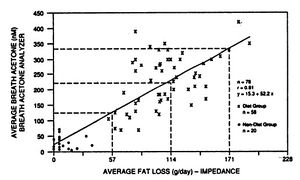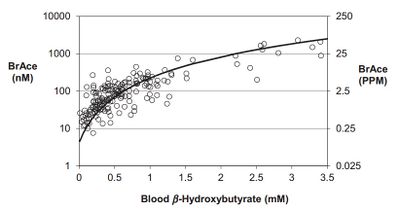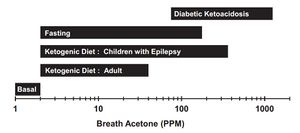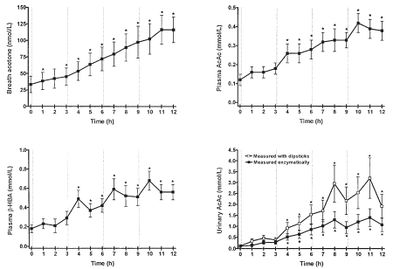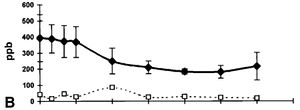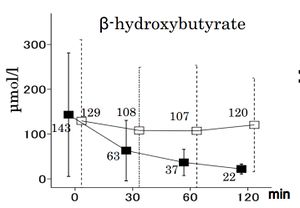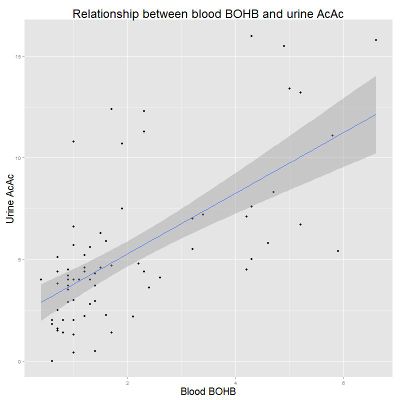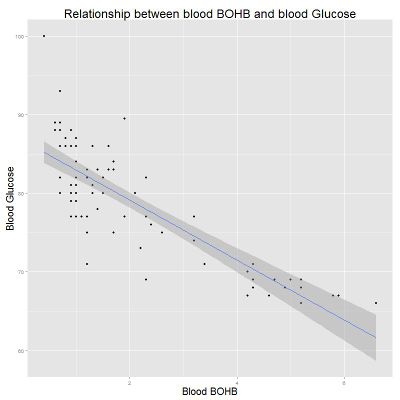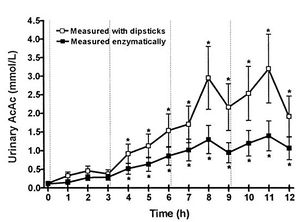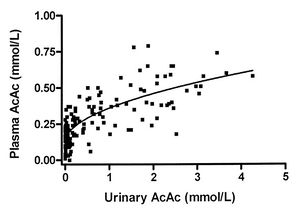Difference between revisions of "Measuring Ketones"
User:Fellrnr (User talk:Fellrnr | contribs) |
User:Fellrnr (User talk:Fellrnr | contribs) |
||
| Line 6: | Line 6: | ||
''Main article: [[Breath Acetone Meters]]'' | ''Main article: [[Breath Acetone Meters]]'' | ||
| − | Acetone | + | Acetone levels correlate well with body fat loss<ref name="Kundu-1993"/>, but are also elevated by the [[Ketogenic Diet]]<ref name="Kalapos-2003"/>, [[MCT]] <ref name="Freund-1966"/> intake, and exercise<ref name="SasakiIshikawa2011"/> even in the absence of weight loss. One study found that a one pound (0.5 Kg) per week fat loss correlated with 1.7 PPM of acetone (67 nmol/L). Each ~40% increase in breath acetone was an additional ∼0.5 Lb (250g) of weekly fat loss<ref name="Anderson2015"/>. |
| + | [[File:Acetone Weight Loss.jpg|center|thumb|300px|Breath acetone against average weight loss]] | ||
| + | Breath acetone correlates well (though not linearly) with blood (BOHB) ketone levels<ref name="Anderson2015"/>. This makes it useful for monitoring the progression of a ketogenic diet, as well as for measuring weight loss. | ||
| + | For Breath Acetone (BrAce) in mmol/L: | ||
| + | BOHB = 0.45 * BrAce<sup>0.5</sup> + 0.1 | ||
| + | Note that the relationship is far from exact (r=0.5 or so.) | ||
[[File:Breath Acetone.jpg|center|thumb|400px|The relationship between breath acetone and blood BOHB from multiple studies.]] | [[File:Breath Acetone.jpg|center|thumb|400px|The relationship between breath acetone and blood BOHB from multiple studies.]] | ||
| + | Breath acetone levels can vary dramatically, with healthy individuals on a regular diet having less than 1 PPM (parts per million) to 1,250 PPM in patients suffering from diabetic ketoacidosis<ref name="SulwayMalins1970"/>, which is an extremely dangerous medical condition. The diagram below shows some typical ranges. (As far as I can tell, for acetone, 1 ppm is 39.7 nmon/L.) | ||
| + | [[File:Acetone Levels.jpg|center|thumb|300px| Ranges of breath acetone for different populations.]] | ||
| + | The charts below show the results of 12 people who consumed for ketogenic meals every three hours following an initial 12 hour fast<ref name="Musa-Veloso-2002"/>. You can see a distinct spike in blood BOHB levels at four, seven, and 10 hours, representing the rise in blood ketones and an hour after each of the meals. The blood AcAc levels rise at four hours and 10 hours, but the pattern is not quite so distinctive. By comparison, breath acetone responds more smoothly, and is less responsive to the changes in BOHB and AcAc. This makes sense given that AcAc decomposes spontaneously to acetone with a half-life of about 12 hours<ref name="HayBond1967"/>, though enzyme activity may dramatically speed this up<ref name="O'LearyBaughn1972"/>. Overall, this is a good indication that breath acetone is a viable way of evaluating underlying blood ketone levels. | ||
| + | [[File:Ketones 4 Ketogenic Meals.jpg|center|thumb|400px|The ketone levels in subjects after a 12 hour fast, followed by four ketogenic meals every 3 hours starting at time zero.]] | ||
| + | Breath Acetone may respond more slowly than blood BOHB to a reduction in ketone levels, but I've found no clear research that tracks both together. One study found levels remained steady for an hour after a high protein meal then dropped over the next 5 hours<ref name="Smith-1999"/>. | ||
| + | [[File:Time Acetone Protein.jpg|center|thumb|300px|Breath acetone after a high protein meal following a 12 hour fast.]] | ||
| + | The nearest comparison I could find used a high carbohydrate meal rather than high protein, which would result in a faster rise in blood sugar & insulin compared with high protein. It also used a low carbohydrate diet rather than a fast and is on diabetic patients<ref name="Haimoto-2009"/>. This makes it a poor comparison, but shows that in principle at least, breath acetone may be slower to respond than blood BOHB. | ||
| + | [[File:BOHB_Response.jpg|center|thumb|300px|Change in blood BOHB after a high carb meal (black squares; open squares are low carb meal.]] | ||
| + | ==Breathing Patterns And Acetone== | ||
| + | Acetone is exchanged mostly in the airways, not the alveoli (the tiny air sacs of the lungs)<ref name="Anderson-2003"/><ref name="Schrikker-1989"/><ref name="Schrikker-1985"/>, so your breathing pattern will have a big impact on the acetone concentration in your breath<ref name="Anderson-2006"/><ref name="SukulTrefz2014"/>: | ||
| + | * A normal, resting breath (called a tidal breath) will result in only about two thirds the maximum acetone concentration. | ||
| + | * A full breath, breathing in deeply and fully exhaling will result in ~85% of maximum acetone concentration but only at the end of the breath. | ||
| + | * Breathing in and out of a bag for six breaths results in the maximum acetone concentration and the best repeatability. Of course, this is the most uncomfortable method. | ||
| + | * Breath holding for over 60 seconds has no impact on breath acetone concentration. | ||
=Measuring beta-hydroxybutyrate (BOHB)= | =Measuring beta-hydroxybutyrate (BOHB)= | ||
BOHB is measured in the blood using a small meter similar to a Blood Glucose Meter. A test strip is placed in the meter and a drop of blood is added. After a few seconds, the meter will indicate the level of Ketones. There are two meters on the market in the US, the Nova Max and the Precision Xtra. | BOHB is measured in the blood using a small meter similar to a Blood Glucose Meter. A test strip is placed in the meter and a drop of blood is added. After a few seconds, the meter will indicate the level of Ketones. There are two meters on the market in the US, the Nova Max and the Precision Xtra. | ||
| Line 55: | Line 74: | ||
<ref name="Medline">http://www.nlm.nih.gov/medlineplus/ency/article/003585.htm Medline Plus Ketones - urine</ref> | <ref name="Medline">http://www.nlm.nih.gov/medlineplus/ency/article/003585.htm Medline Plus Ketones - urine</ref> | ||
<ref name="sensorhealth.com">http://sensorhealth.com/UrineStripFalsePositive-NegativeCauses.pdf Urine Strip False Positive-Negative Causes</ref> | <ref name="sensorhealth.com">http://sensorhealth.com/UrineStripFalsePositive-NegativeCauses.pdf Urine Strip False Positive-Negative Causes</ref> | ||
| − | |||
<ref name="Gilbert-2000"> DL. Gilbert, PL. Pyzik, JM. Freeman, The ketogenic diet: seizure control correlates better with serum beta-hydroxybutyrate than with urine ketones., J Child Neurol, volume 15, issue 12, pages 787-90, Dec 2000, PMID [http://www.ncbi.nlm.nih.gov/pubmed/11198492 11198492]</ref> | <ref name="Gilbert-2000"> DL. Gilbert, PL. Pyzik, JM. Freeman, The ketogenic diet: seizure control correlates better with serum beta-hydroxybutyrate than with urine ketones., J Child Neurol, volume 15, issue 12, pages 787-90, Dec 2000, PMID [http://www.ncbi.nlm.nih.gov/pubmed/11198492 11198492]</ref> | ||
<ref name="Galvin-1968"> RD. Galvin, JA. Harris, RE. Johnson, Urinary excretion of beta-hydroxybutyrate and acetoacetate during experimental ketosis., Q J Exp Physiol Cogn Med Sci, volume 53, issue 2, pages 181-93, Apr 1968, PMID [http://www.ncbi.nlm.nih.gov/pubmed/5185570 5185570]</ref> | <ref name="Galvin-1968"> RD. Galvin, JA. Harris, RE. Johnson, Urinary excretion of beta-hydroxybutyrate and acetoacetate during experimental ketosis., Q J Exp Physiol Cogn Med Sci, volume 53, issue 2, pages 181-93, Apr 1968, PMID [http://www.ncbi.nlm.nih.gov/pubmed/5185570 5185570]</ref> | ||
| Line 61: | Line 79: | ||
<ref name="Wildenhoff-1977">KE. Wildenhoff, Tubular reabsorption and urinary excretion of acetoacetate and 3-hydroxybutyrate in normal subjects and juvenile diabetics., Acta Med Scand, volume 201, issue 1-2, pages 63-7, Jan 1977, PMID [http://www.ncbi.nlm.nih.gov/pubmed/835373 835373]</ref> | <ref name="Wildenhoff-1977">KE. Wildenhoff, Tubular reabsorption and urinary excretion of acetoacetate and 3-hydroxybutyrate in normal subjects and juvenile diabetics., Acta Med Scand, volume 201, issue 1-2, pages 63-7, Jan 1977, PMID [http://www.ncbi.nlm.nih.gov/pubmed/835373 835373]</ref> | ||
<ref name="Cahill2006">George F. Cahill, Fuel Metabolism in Starvation, Annual Review of Nutrition, volume 26, issue 1, 2006, pages 1–22, ISSN [http://www.worldcat.org/issn/0199-9885 0199-9885], doi [http://dx.doi.org/10.1146/annurev.nutr.26.061505.111258 10.1146/annurev.nutr.26.061505.111258]</ref> | <ref name="Cahill2006">George F. Cahill, Fuel Metabolism in Starvation, Annual Review of Nutrition, volume 26, issue 1, 2006, pages 1–22, ISSN [http://www.worldcat.org/issn/0199-9885 0199-9885], doi [http://dx.doi.org/10.1146/annurev.nutr.26.061505.111258 10.1146/annurev.nutr.26.061505.111258]</ref> | ||
| + | <ref name="Anderson-2006">JC. Anderson, WJ. Lamm, MP. Hlastala, Measuring airway exchange of endogenous acetone using a single-exhalation breathing maneuver., J Appl Physiol (1985), volume 100, issue 3, pages 880-9, Mar 2006, doi [http://dx.doi.org/10.1152/japplphysiol.00868.2005 10.1152/japplphysiol.00868.2005], PMID [http://www.ncbi.nlm.nih.gov/pubmed/16282431 16282431]</ref> | ||
| + | <ref name="SukulTrefz2014">Pritam Sukul, Phillip Trefz, Jochen K Schubert, Wolfram Miekisch, Immediate effects of breath holding maneuvers onto composition of exhaled breath, Journal of Breath Research, volume 8, issue 3, 2014, pages 037102, ISSN [http://www.worldcat.org/issn/1752-7155 1752-7155], doi [http://dx.doi.org/10.1088/1752-7155/8/3/037102 10.1088/1752-7155/8/3/037102]</ref> | ||
| + | <ref name="Schrikker-1985">AC. Schrikker, WR. de Vries, A. Zwart, SC. Luijendijk, Uptake of highly soluble gases in the epithelium of the conducting airways., Pflugers Arch, volume 405, issue 4, pages 389-94, Dec 1985, PMID [http://www.ncbi.nlm.nih.gov/pubmed/4080516 4080516]</ref> | ||
| + | <ref name="Schrikker-1989">AC. Schrikker, WR. de Vries, A. Zwart, SC. Luijendijk, The excretion of highly soluble gases by the lung in man., Pflugers Arch, volume 415, issue 2, pages 214-9, Nov 1989, PMID [http://www.ncbi.nlm.nih.gov/pubmed/2556686 2556686]</ref> | ||
| + | <ref name="Anderson-2003">JC. Anderson, AL. Babb, MP. Hlastala, Modeling soluble gas exchange in the airways and alveoli., Ann Biomed Eng, volume 31, issue 11, pages 1402-22, Dec 2003, PMID [http://www.ncbi.nlm.nih.gov/pubmed/14758930 14758930]</ref> | ||
| + | <ref name="O'LearyBaughn1972">Marion H. O'Leary, Richard L. Baughn, Acetoacetate decarboxylase. Identification of the rate-determining step in the primary amine catalyzed reaction and in the enzymic reaction, Journal of the American Chemical Society, volume 94, issue 2, 1972, pages 626–630, ISSN [http://www.worldcat.org/issn/0002-7863 0002-7863], doi [http://dx.doi.org/10.1021/ja00757a051 10.1021/ja00757a051]</ref> | ||
| + | <ref name="HayBond1967">RW Hay, MA Bond, Kinetics of the Decarboxylation of Acetoacetic acid, Australian Journal of Chemistry, volume 20, issue 9, 1967, pages 1823, ISSN [http://www.worldcat.org/issn/0004-9425 0004-9425], doi [http://dx.doi.org/10.1071/CH9671823 10.1071/CH9671823]</ref> | ||
| + | <ref name="Musa-Veloso-2002">K. Musa-Veloso, SS. Likhodii, SC. Cunnane, Breath acetone is a reliable indicator of ketosis in adults consuming ketogenic meals., Am J Clin Nutr, volume 76, issue 1, pages 65-70, Jul 2002, PMID [http://www.ncbi.nlm.nih.gov/pubmed/12081817 12081817]</ref> | ||
| + | <ref name="Haimoto-2009">H. Haimoto, T. Sasakabe, H. Umegaki, K. Wakai, Acute metabolic responses to a high-carbohydrate meal in outpatients with type 2 diabetes treated with a low-carbohydrate diet: a crossover meal tolerance study., Nutr Metab (Lond), volume 6, pages 52, Dec 2009, doi [http://dx.doi.org/10.1186/1743-7075-6-52 10.1186/1743-7075-6-52], PMID [http://www.ncbi.nlm.nih.gov/pubmed/20040075 20040075]</ref> | ||
| + | <ref name="Smith-1999">D. Smith, P. Spanel, S. Davies, Trace gases in breath of healthy volunteers when fasting and after a protein-calorie meal: a preliminary study., J Appl Physiol (1985), volume 87, issue 5, pages 1584-8, Nov 1999, PMID [http://www.ncbi.nlm.nih.gov/pubmed/10562594 10562594]</ref> | ||
| + | <ref name="SulwayMalins1970">M.J. Sulway, J.M. Malins, ACETONE IN DIABETIC KETOACIDOSIS, The Lancet, volume 296, issue 7676, 1970, pages 736–740, ISSN [http://www.worldcat.org/issn/01406736 01406736], doi [http://dx.doi.org/10.1016/S0140-6736(70)90218-7 10.1016/S0140-6736(70)90218-7]</ref> | ||
| + | <ref name="SasakiIshikawa2011">H. Sasaki, S. Ishikawa, H. Ueda, Y. Kimura, Acetone Response during Graded and Prolonged Exercise, volume 0, 2011, pages 119–124, doi [http://dx.doi.org/10.1159/000321951 10.1159/000321951]</ref> | ||
| + | <ref name="Kalapos-2003">MP. Kalapos, On the mammalian acetone metabolism: from chemistry to clinical implications., Biochim Biophys Acta, volume 1621, issue 2, pages 122-39, May 2003, PMID [http://www.ncbi.nlm.nih.gov/pubmed/12726989 12726989]</ref> | ||
| + | <ref name="Freund-1966">G. Freund, RL. Weinsier, Standardized ketosis in man following medium chain triglyceride ingestion., Metabolism, volume 15, issue 11, pages 980-91, Nov 1966, PMID [http://www.ncbi.nlm.nih.gov/pubmed/5922367 5922367]</ref> | ||
| + | <ref name="Kundu-1993">SK. Kundu, JA. Bruzek, R. Nair, AM. Judilla, Breath acetone analyzer: diagnostic tool to monitor dietary fat loss., Clin Chem, volume 39, issue 1, pages 87-92, Jan 1993, PMID [http://www.ncbi.nlm.nih.gov/pubmed/8419065 8419065]</ref> | ||
<ref name="Anderson2015">Joseph C. Anderson, Measuring breath acetone for monitoring fat loss: Review, Obesity, volume 23, issue 12, 2015, pages 2327–2334, ISSN [http://www.worldcat.org/issn/19307381 19307381], doi [http://dx.doi.org/10.1002/oby.21242 10.1002/oby.21242]</ref> | <ref name="Anderson2015">Joseph C. Anderson, Measuring breath acetone for monitoring fat loss: Review, Obesity, volume 23, issue 12, 2015, pages 2327–2334, ISSN [http://www.worldcat.org/issn/19307381 19307381], doi [http://dx.doi.org/10.1002/oby.21242 10.1002/oby.21242]</ref> | ||
<ref name="Kossoff-2011-2035">Eric. Kossoff, [http://www.amazon.com/Ketogenic-Diets-Eric-H-Kossoff/dp/1936303108 Ketogenic diets : treatments for epilepsy and other disorders], date 2011, publisher Demos Health, location New York, isbn 1-936303-10-8, Kindle Offset 2035</ref> | <ref name="Kossoff-2011-2035">Eric. Kossoff, [http://www.amazon.com/Ketogenic-Diets-Eric-H-Kossoff/dp/1936303108 Ketogenic diets : treatments for epilepsy and other disorders], date 2011, publisher Demos Health, location New York, isbn 1-936303-10-8, Kindle Offset 2035</ref> | ||
</references> | </references> | ||
Revision as of 05:31, 17 June 2017
An important aspect of the Ketogenic Diet is knowing how high your ketone levels are. There are three types of Ketones; beta-hydroxybutyrate (BOHB) which is measured in the blood, acetoacetate (AcAc) which is typically measured in the urine, and acetone which is typically measured in the breath.
- Measuring Acetone in the breath is becoming a good option, and I believe that this is probably the future of ketone measurement. It's an area of rapid development, and it was not available when I performed my Ketogenic Experiment, so I'm still gathering data.
- Measuring BOHB is the most accurate, and it's now practical at home using a similar technique to measuring blood glucose, but it's really expensive at several dollars per test.
- The easiest and cheapest technique is to measure AcAc in the urine using a test strip. However, this approach is too inaccurate to be useful.
Contents
1 Measuring Acetone
Main article: Breath Acetone Meters
Acetone levels correlate well with body fat loss[1], but are also elevated by the Ketogenic Diet[2], MCT [3] intake, and exercise[4] even in the absence of weight loss. One study found that a one pound (0.5 Kg) per week fat loss correlated with 1.7 PPM of acetone (67 nmol/L). Each ~40% increase in breath acetone was an additional ∼0.5 Lb (250g) of weekly fat loss[5].
Breath acetone correlates well (though not linearly) with blood (BOHB) ketone levels[5]. This makes it useful for monitoring the progression of a ketogenic diet, as well as for measuring weight loss.
For Breath Acetone (BrAce) in mmol/L: BOHB = 0.45 * BrAce0.5 + 0.1
Note that the relationship is far from exact (r=0.5 or so.)
Breath acetone levels can vary dramatically, with healthy individuals on a regular diet having less than 1 PPM (parts per million) to 1,250 PPM in patients suffering from diabetic ketoacidosis[6], which is an extremely dangerous medical condition. The diagram below shows some typical ranges. (As far as I can tell, for acetone, 1 ppm is 39.7 nmon/L.)
The charts below show the results of 12 people who consumed for ketogenic meals every three hours following an initial 12 hour fast[7]. You can see a distinct spike in blood BOHB levels at four, seven, and 10 hours, representing the rise in blood ketones and an hour after each of the meals. The blood AcAc levels rise at four hours and 10 hours, but the pattern is not quite so distinctive. By comparison, breath acetone responds more smoothly, and is less responsive to the changes in BOHB and AcAc. This makes sense given that AcAc decomposes spontaneously to acetone with a half-life of about 12 hours[8], though enzyme activity may dramatically speed this up[9]. Overall, this is a good indication that breath acetone is a viable way of evaluating underlying blood ketone levels.
Breath Acetone may respond more slowly than blood BOHB to a reduction in ketone levels, but I've found no clear research that tracks both together. One study found levels remained steady for an hour after a high protein meal then dropped over the next 5 hours[10].
The nearest comparison I could find used a high carbohydrate meal rather than high protein, which would result in a faster rise in blood sugar & insulin compared with high protein. It also used a low carbohydrate diet rather than a fast and is on diabetic patients[11]. This makes it a poor comparison, but shows that in principle at least, breath acetone may be slower to respond than blood BOHB.
1.1 Breathing Patterns And Acetone
Acetone is exchanged mostly in the airways, not the alveoli (the tiny air sacs of the lungs)[12][13][14], so your breathing pattern will have a big impact on the acetone concentration in your breath[15][16]:
- A normal, resting breath (called a tidal breath) will result in only about two thirds the maximum acetone concentration.
- A full breath, breathing in deeply and fully exhaling will result in ~85% of maximum acetone concentration but only at the end of the breath.
- Breathing in and out of a bag for six breaths results in the maximum acetone concentration and the best repeatability. Of course, this is the most uncomfortable method.
- Breath holding for over 60 seconds has no impact on breath acetone concentration.
2 Measuring beta-hydroxybutyrate (BOHB)
BOHB is measured in the blood using a small meter similar to a Blood Glucose Meter. A test strip is placed in the meter and a drop of blood is added. After a few seconds, the meter will indicate the level of Ketones. There are two meters on the market in the US, the Nova Max and the Precision Xtra.
- The ketone test strips for Nova Max are cheaper (around $27 for 10 strips), but less accurate and there tend to be a high number of 'bad' test strips. Error: Could not parse data from Amazon!.
- The ketone test strips for the Precision Xtra are far more expensive (around $58 for 10 strips), but better quality. Error: Could not parse data from Amazon!.
- The best option I've found is to order the Precision Xtra strips from Canada for $23 for 10 strips. I've ordered from the Ketone Strips from Universal Drugstore many times and I've been pleased with their service. It takes a couple of weeks for delivery, and shipping is $7.
- You have to draw a drop of blood for this testing, and I'd recommend the Owen Mumford Advanced Lancing Device Error: Could not parse data from Amazon!. It's not much less painful than other lancing devices, but every bit helps. I also use the narrow (33) gauge BD Ultra-Fine Lancets Error: Could not parse data from Amazon!.
3 Measuring Acetoacetate (AcAc)
AcAc is typically measured in the urine using a test strip, which check for 10 different things in addition to AcAc, including trace blood, hydration status and urine acidity. (It's important to test for trace blood in your urine if you're on the ketogenic diet to detect Kidney Stones early.) The test strips are cheap, costing around $0.20 each. Error: Could not parse data from Amazon!. However, AcAc levels tend to correspond poorly to blood ketone levels. During Ketoadaptation, I've found urine levels can be 4x higher than blood ketone levels, but after adaptation the urine levels tend to drop much lower. Hydration status also greatly affects urine ketone levels, and of the levels you're detecting are based on the urine produced since you last emptied your bladder, so they can be quite delayed. See below for a more detailed look at the problems with measuring urine ketones.
4 My Results
I measured my blood BOHB, urine AcAc (using (KetoAnalysis), and my blood glucose. The charts below show the relationship between the values, with the regression line in blue and the 95% confidence intervals shaded. As you can see, for my readings there is better correlation between blood glucose and blood BOHB than there is to urine AcAc. I tried adjusting for hydration using the Urine Specific Gravity values from the test strips, but this made little difference to the correlation. Multiple regression of blood glucose and urine AcAc to blood BOHB did improve the model to r2=0.73.
5 Problems with Measuring Urine Ketones
In the past the only viable method of measuring Ketones was to use a Urine dipstick, but this is too inaccurate to be useful.
- Urine dipsticks require you to match the color of the test strip against reference patches, so it is not particularly precise. Using image analysis (KetoAnalysis) can help somewhat. (The test strips use a nitroprusside reagent which changes color from pink to maroon. The addition of hydrogen peroxide does not improve the ability of the urine tests to detect BOHB[17].)
- Worse, there is evidence that the values read from urine dipsticks overestimate the level of ketones in the urine. A study that compared the values from Ketostix with an enzymatic test found the formula "urinary acetoacetate = 0.40(dipstick value) + 0.15" would help correct the overestimation[7].
- To compound matters further, urine levels do not reflect blood levels of AcAc very well.
- High level of hydration will dilute urine ketone levels[18].
- Kidney function can change the urine levels[19] as the kidney will reabsorb AcAc[20]. With starvation ketosis, the kidneys increase the reabsorption over time, with one study showing a progression of AcAc reabsorption from 47 (+/-10) mumoles/min on day 3 to 106 (+/-15) on day 10, 89 (+/-10) on day 17 and 96 (+/-10) on day 24[21]. Most studies demonstrate no maximum reabsorption rate[22][21].
- There is also a time delay if the blood levels are changing, this will not be reflected in the urine levels immediately[19].
- A study indicated that the level of urine AcAc and blood AcAc vary in a non-linear manner, following the equation "y = 0.3x0.6 + 0.07" (after correction), but r2 was only 0.59 [7].
- Further problems arise because the levels of AcAc can be quite different to BOHB levels, as shown below. A study of children using the Ketogenic Diet for epilepsy showed that when blood BOHB levels are over 2 mmol/l, urine AcAc dipsticks indicate levels of 80-160 mmol/l[23].
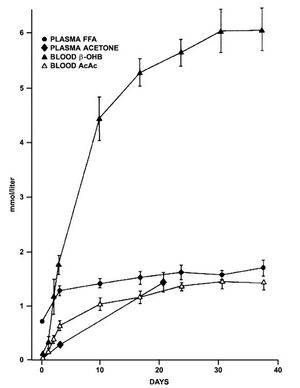
- Finally, false positives can occur for a number of reasons.
6 See Also
- The classifications and types of Low Carbohydrate Diet.
- An introduction to the Ketogenic Diet.
- My experiences with ultrarunning on the Ketogenic Diet
- How the Ketogenic Diet can be used for the treatment and management of disease.
- Health Risks of the Ketogenic Diet
- The time frame and changes that occur with Ketoadaptation
- What are Ketones
- How to measure Ketones
- What ketone levels to aim for
- The pros and cons of the Ketogenic Diet for athletes
- The Types of Ketogenic Diet
- My Ketogenic Recipes
- Non-Ketogenic Low Carbohydrate Diets
7 References
- ↑ SK. Kundu, JA. Bruzek, R. Nair, AM. Judilla, Breath acetone analyzer: diagnostic tool to monitor dietary fat loss., Clin Chem, volume 39, issue 1, pages 87-92, Jan 1993, PMID 8419065
- ↑ MP. Kalapos, On the mammalian acetone metabolism: from chemistry to clinical implications., Biochim Biophys Acta, volume 1621, issue 2, pages 122-39, May 2003, PMID 12726989
- ↑ G. Freund, RL. Weinsier, Standardized ketosis in man following medium chain triglyceride ingestion., Metabolism, volume 15, issue 11, pages 980-91, Nov 1966, PMID 5922367
- ↑ H. Sasaki, S. Ishikawa, H. Ueda, Y. Kimura, Acetone Response during Graded and Prolonged Exercise, volume 0, 2011, pages 119–124, doi 10.1159/000321951
- ↑ 5.0 5.1 Joseph C. Anderson, Measuring breath acetone for monitoring fat loss: Review, Obesity, volume 23, issue 12, 2015, pages 2327–2334, ISSN 19307381, doi 10.1002/oby.21242
- ↑ M.J. Sulway, J.M. Malins, ACETONE IN DIABETIC KETOACIDOSIS, The Lancet, volume 296, issue 7676, 1970, pages 736–740, ISSN 01406736, doi 10.1016/S0140-6736(70)90218-7
- ↑ 7.0 7.1 7.2 K. Musa-Veloso, SS. Likhodii, SC. Cunnane, Breath acetone is a reliable indicator of ketosis in adults consuming ketogenic meals., Am J Clin Nutr, volume 76, issue 1, pages 65-70, Jul 2002, PMID 12081817
- ↑ RW Hay, MA Bond, Kinetics of the Decarboxylation of Acetoacetic acid, Australian Journal of Chemistry, volume 20, issue 9, 1967, pages 1823, ISSN 0004-9425, doi 10.1071/CH9671823
- ↑ Marion H. O'Leary, Richard L. Baughn, Acetoacetate decarboxylase. Identification of the rate-determining step in the primary amine catalyzed reaction and in the enzymic reaction, Journal of the American Chemical Society, volume 94, issue 2, 1972, pages 626–630, ISSN 0002-7863, doi 10.1021/ja00757a051
- ↑ D. Smith, P. Spanel, S. Davies, Trace gases in breath of healthy volunteers when fasting and after a protein-calorie meal: a preliminary study., J Appl Physiol (1985), volume 87, issue 5, pages 1584-8, Nov 1999, PMID 10562594
- ↑ H. Haimoto, T. Sasakabe, H. Umegaki, K. Wakai, Acute metabolic responses to a high-carbohydrate meal in outpatients with type 2 diabetes treated with a low-carbohydrate diet: a crossover meal tolerance study., Nutr Metab (Lond), volume 6, pages 52, Dec 2009, doi 10.1186/1743-7075-6-52, PMID 20040075
- ↑ JC. Anderson, AL. Babb, MP. Hlastala, Modeling soluble gas exchange in the airways and alveoli., Ann Biomed Eng, volume 31, issue 11, pages 1402-22, Dec 2003, PMID 14758930
- ↑ AC. Schrikker, WR. de Vries, A. Zwart, SC. Luijendijk, The excretion of highly soluble gases by the lung in man., Pflugers Arch, volume 415, issue 2, pages 214-9, Nov 1989, PMID 2556686
- ↑ AC. Schrikker, WR. de Vries, A. Zwart, SC. Luijendijk, Uptake of highly soluble gases in the epithelium of the conducting airways., Pflugers Arch, volume 405, issue 4, pages 389-94, Dec 1985, PMID 4080516
- ↑ JC. Anderson, WJ. Lamm, MP. Hlastala, Measuring airway exchange of endogenous acetone using a single-exhalation breathing maneuver., J Appl Physiol (1985), volume 100, issue 3, pages 880-9, Mar 2006, doi 10.1152/japplphysiol.00868.2005, PMID 16282431
- ↑ Pritam Sukul, Phillip Trefz, Jochen K Schubert, Wolfram Miekisch, Immediate effects of breath holding maneuvers onto composition of exhaled breath, Journal of Breath Research, volume 8, issue 3, 2014, pages 037102, ISSN 1752-7155, doi 10.1088/1752-7155/8/3/037102
- ↑ Silas W. Smith, Alex F. Manini, Tibor Szekely, Robert S. Hoffman, Bedside Detection of Urine β-Hydroxybutyrate in Diagnosing Metabolic Acidosis, Academic Emergency Medicine, volume 15, issue 8, 2008, pages 751–756, ISSN 10696563, doi 10.1111/j.1553-2712.2008.00175.x
- ↑ Eric. Kossoff, Ketogenic diets : treatments for epilepsy and other disorders, date 2011, publisher Demos Health, location New York, isbn 1-936303-10-8, Kindle Offset 2035
- ↑ 19.0 19.1 L. Laffel, Ketone bodies: a review of physiology, pathophysiology and application of monitoring to diabetes., Diabetes Metab Res Rev, volume 15, issue 6, pages 412-26, PMID 10634967
- ↑ RD. Galvin, JA. Harris, RE. Johnson, Urinary excretion of beta-hydroxybutyrate and acetoacetate during experimental ketosis., Q J Exp Physiol Cogn Med Sci, volume 53, issue 2, pages 181-93, Apr 1968, PMID 5185570
- ↑ 21.0 21.1 DG. Sapir, OE. Owen, Renal conservation of ketone bodies during starvation., Metabolism, volume 24, issue 1, pages 23-33, Jan 1975, PMID 234169
- ↑ KE. Wildenhoff, Tubular reabsorption and urinary excretion of acetoacetate and 3-hydroxybutyrate in normal subjects and juvenile diabetics., Acta Med Scand, volume 201, issue 1-2, pages 63-7, Jan 1977, PMID 835373
- ↑ DL. Gilbert, PL. Pyzik, JM. Freeman, The ketogenic diet: seizure control correlates better with serum beta-hydroxybutyrate than with urine ketones., J Child Neurol, volume 15, issue 12, pages 787-90, Dec 2000, PMID 11198492
- ↑ George F. Cahill, Fuel Metabolism in Starvation, Annual Review of Nutrition, volume 26, issue 1, 2006, pages 1–22, ISSN 0199-9885, doi 10.1146/annurev.nutr.26.061505.111258
- ↑ Urine Dipstick Analysis, http://www.patient.co.uk/doctor/urine-dipstick-analysis, Accessed on 9 January 2014
- ↑ 26.0 26.1 26.2 26.3 http://sensorhealth.com/UrineStripFalsePositive-NegativeCauses.pdf Urine Strip False Positive-Negative Causes
- ↑ 27.0 27.1 27.2 27.3 27.4 http://www.drsperoni.com/downloads/articles/Urinalysis_Results_Interpretation.pdf Urinalysis Results Interpretation
- ↑ http://www.nlm.nih.gov/medlineplus/ency/article/003585.htm Medline Plus Ketones - urine
